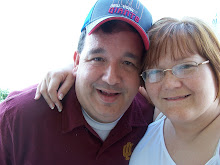Sharing Our Faith
Tonight at church, the preacher taught that every church member is expected to share their faith with others on a regular basis. With that in mind, I have a question to pose. Can a moderately or severely disabled person and a nondisabled person both meet the expectation of the church? Granted, there are communication variances between different disabled individuals. Some can speak well and others cannot. Some can use sign language and others cannot. You get the idea. But bear with me for a moment as I flesh out this question.
Take me for example. Besides the occasional excursion across the street on my electric wheelchair, I'm pretty much homebound except for when my wife takes me out to church or somewhere or when I take Medicaid transportation to go to the doctor. I have very little face to face contact with people outside my wife's family and my church family. I cannot work and have basically no friends that I can hang out with so those outlets are in the toilet. Finally, I couldn't go on a mission trip if I wanted to because I couldn't pass the physical.
On the other hand, when I do encounter people, they notice a difference about me almost immediately. I almost always have a smile on my face and I greet people with a "Hi" or a "How are you?" I tell people "God Bless You" when I feel like I should say that. Talk to me very long online or off and you'll find out I'm a Christian. Offline you'll already know I'm disabled, online that tidbit of information won't be long behind my profession of faith. I may not be able to do a lot offline, but I spend a good bit of time online trying to encourage people and lead them to the right path.
How many nondisabled people do you encounter every day (even ones who profess to be Christion) who have frowns on their faces? How many fail to greet you and ask how you're doing? How many have conversations with you for months or even years before you find out they are believers? How many, even after they profess to be Christians, are you truly unable to tell a difference between them and nonbelievers?
Personally, I think disabled Christians have an advantage over nondisabled Christians in sharing our faith. People notice us right away and they see that something is different about us. If we have smiles on our faces and if we are being nice to people, folks will notice not only our disabilities but the way we live our lives despite our disabilities. They'll want to know how we do it and we have the answer for them, "Jesus Christ." We don't have to go on mission trips or seek people out. People will find us if we go through our daily lives with the Love of Christ overflowing.
So let me ask that question another way. Can a nondisabled person share their faith just as easily as a moderately to severely disabled person? For once, I think the disabled people have it easier. :-)
Take me for example. Besides the occasional excursion across the street on my electric wheelchair, I'm pretty much homebound except for when my wife takes me out to church or somewhere or when I take Medicaid transportation to go to the doctor. I have very little face to face contact with people outside my wife's family and my church family. I cannot work and have basically no friends that I can hang out with so those outlets are in the toilet. Finally, I couldn't go on a mission trip if I wanted to because I couldn't pass the physical.
On the other hand, when I do encounter people, they notice a difference about me almost immediately. I almost always have a smile on my face and I greet people with a "Hi" or a "How are you?" I tell people "God Bless You" when I feel like I should say that. Talk to me very long online or off and you'll find out I'm a Christian. Offline you'll already know I'm disabled, online that tidbit of information won't be long behind my profession of faith. I may not be able to do a lot offline, but I spend a good bit of time online trying to encourage people and lead them to the right path.
How many nondisabled people do you encounter every day (even ones who profess to be Christion) who have frowns on their faces? How many fail to greet you and ask how you're doing? How many have conversations with you for months or even years before you find out they are believers? How many, even after they profess to be Christians, are you truly unable to tell a difference between them and nonbelievers?
Personally, I think disabled Christians have an advantage over nondisabled Christians in sharing our faith. People notice us right away and they see that something is different about us. If we have smiles on our faces and if we are being nice to people, folks will notice not only our disabilities but the way we live our lives despite our disabilities. They'll want to know how we do it and we have the answer for them, "Jesus Christ." We don't have to go on mission trips or seek people out. People will find us if we go through our daily lives with the Love of Christ overflowing.
So let me ask that question another way. Can a nondisabled person share their faith just as easily as a moderately to severely disabled person? For once, I think the disabled people have it easier. :-)

